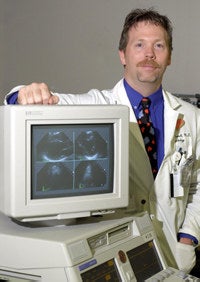Research shows smoking one cigarette affects heart
GREENVILLE, N.C. (July 15, 2001) — Preliminary research has shown that smoking a single cigarette can impair the heart, causing it to have to work harder.
The research, released June 28 at the American Society of Echocardiography’s 12th annual scientific sessions in Seattle, suggests that nicotine alone is not the trigger for this change in cardiac performance, as researchers did not see similar cardiac responses in participants who simply chewed nicotine gum.

Dr. Vincent L. Sorrell. Photo by Cliff Hollis.
The lead researcher for the project was Dr. Vincent L. Sorrell, a cardiologist and associate professor of medicine at the Brody School of Medicine at East Carolina University. Other participants include lead author Dr. Firas Ghanem, a resident physician in the ECU Department of Internal Medicine, lead sonographer Christopher Mann and cardiologist Dr. Andrew Sumner, ECU assistant professor of medicine.
While physicians have long recognized that nicotine increases heart rate and blood pressure, this research concludes that smoking even a single cigarette causes an abrupt change in the performance of the heart’s left ventricle while the heart chamber is filling with blood. This change in cardiac function is likely the result of the 4,000 chemicals and 43 carcinogens present in tobacco smoke.
Smoking puts people at risk for cardiovascular disease by interfering with the functioning of the endothelium–the layer of cells lining the inside of arteries. Each year in the United States, approximately 53,000 deaths are attributed to cardiovascular disease caused by smoking. Cigarette smoking also nearly doubles the risk of suffering a stroke.
Sorrell said a recent ABC News special program on smoking and young women rang true to what he’s heard from his patients. “Every one of these young women said, ‘If you get lung cancer that requires them to remove one of your lungs, you won’t be able to walk up a flight of stairs anymore. We can’t do that now.’ That’s what I hear from my cardiology patients all the time, and that’s what gave me the idea for this research,” Sorrell said. “These same patients’ echocardiograms and chest X-rays look entirely normal, yet they continue to complain of shortness of breath. Something has to be going on in their hearts, and shortness of breath is a common manifestation of abnormal left ventricle relaxation.”
Researchers at the Brody School of Medicine studied a group of 27 healthy young individuals with no evidence of organic heart disease immediately before and after smoking one cigarette or chewing nicotine gum for 15 minutes. Using echocardiography, which provides real-time images of the heart and surrounding blood vessels, researchers measured the participants’ blood flow rising through the pulmonary veins and entering the left ventricle across the mitral valve. They performed numerous recordings and measurements of cardiac performance without knowing which group the patients were in — cigarette smokers or nicotine gum chewers.
Sorrell said the findings were a little surprising. “This study shows for the first time that smoking even one cigarette can dramatically and negatively affect the heart’s performance. Poor heart performance can cause a significant loss of exercise endurance or tolerance,” he said. “The most striking thing about this study is that this is happening right in front of us every day.”
In Europe, research looking at exercise tolerance has shown that the key is not how well your heart pumps but how well it is able to relax, Sorrell said. Diastolic dysfunction is when the heart’s relaxing phase is weak.
“Our research was the preliminary investigation to see if we could detect any change in the diastolic dysfunction between these two groups of young healthy adults,” Sorrell said.
Contact: Jeannine Manning Hutson | 252-744-2481